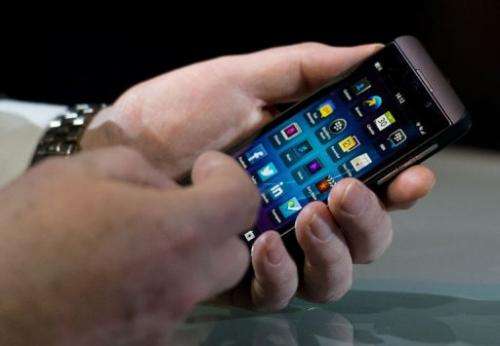A new touchscreen Z10 Blackberry devices in central London on January 30, 2013. BlackBerry's new smartphone platform launched this week faces an uphill battle winning back corporate and government users who helped spawn the "crackberry" culture, analysts say.
BlackBerry's new smartphone platform launched this week faces an uphill battle winning back corporate and government users who helped spawn the "crackberry" culture, analysts say.
The Canadian-based firm, which rebranded itself with the launch of its BlackBerry 10 platform, must stem the loss of its core customers and win over those who migrated to the iPhone or Android devices, according to industry watchers.
While BlackBerry helped create a culture of mobile users glued to smartphones nearly a decade ago, many of those customers have since moved on to Apple or Android.
"They still have work ahead of them and that is to get their existing customers as well as Android, Apple and Windows customers to give BlackBerry a second look," said Dan Shey, analyst at ABI Research.
"They've been losing some of those customers, not necessarily an entire company but losing the users, losing the executive who wants to use an iPhone."
Shey said BlackBerry has succeeded from a technical perspective in upgrading its operating system and producing "a pretty sexy device" in the touchscreen Z10, the first phone launched using the BlackBerry 10 platform.
"BlackBerry has now checked the boxes, they are a one-stop shop to address all the enterprise issues, so they are in a good position to win back customers," he added.
But in the past few years, some US government agencies, long seen as the bread and butter for BlackBerry, have been switching. And the sector faces challenges from the trend of people carrying two phones or bringing their own device to the enterprise.
The Pentagon said last year it would no longer retain an exclusive deal for the devices and invited companies such as Apple to bid for contracts. And globally, BlackBerry's smartphone market share has slid to less than five percent, according to research firm IDC.
IDC analyst Ramon Llamas said, however, that BlackBerry "is still considered the gold standard in terms of government and enterprise security."
"If it's good enough for the president of the United States, it's got to be very powerful and secure for those enterprise and government users as well," he added.
Llamas added that in a market that has been volatile over the past few years, "there are Android and iPhone users who are looking for something new and something different. It's very likely they will look at the BlackBerry, but they could look at Windows Phone too."
RBC Capital Markets analyst Mark Sue says the company has a chance to regain some ground, but that it will be difficult.
"BlackBerry's base is eroding, so time is of the essence and lower-priced devices for emerging markets and a larger screen model must also be in the lineup in order to target a broader audience," Sue said in a research note.
"The older demographics represent Blackberry's loyal user base and our study shows that the brand has quite a bit of work to do to attract new users."
But he added that BlackBerry may be able to take advantage of the "fatigue factor with the status quo of homogeneous devices" and that the new phones "may appeal to existing BlackBerry fans and enterprise users looking for a next-generation device."
Wednesday's launch included news that the company Research in Motion officially changed its name to BlackBerry as it launched the new platform aimed at helping the firm regain traction in a market now dominated by rivals.
BlackBerry is appealing to the corporate sector with a system that allows for separate spaces on a single device for work and personal data. Such an option means that if a user changes jobs, an employer can disable the device's corporate side without affecting personal data.
The company is also offering a software platform that can allow an enterprise to manage devices using its system as well as those of rivals from Apple or Android.
Gerry Purdy, analyst at Mobiletrax, said BlackBerry's first task was to stop losing big corporate and government customers.
"They've lost a lot of major accounts to the iPhone or Android, and they are probably going to find it very difficult to win back those accounts," he said.
"So it's important to hold on to the customers they have."
Purdy said BlackBerry still has an opportunity with customers not yet on smartphones, and getting current ones to upgrade.
"I would say they have a better than 50 percent chance of making it," he said, while adding that it is "a battle is for the number three position in the market."
(c) 2013 AFP






















